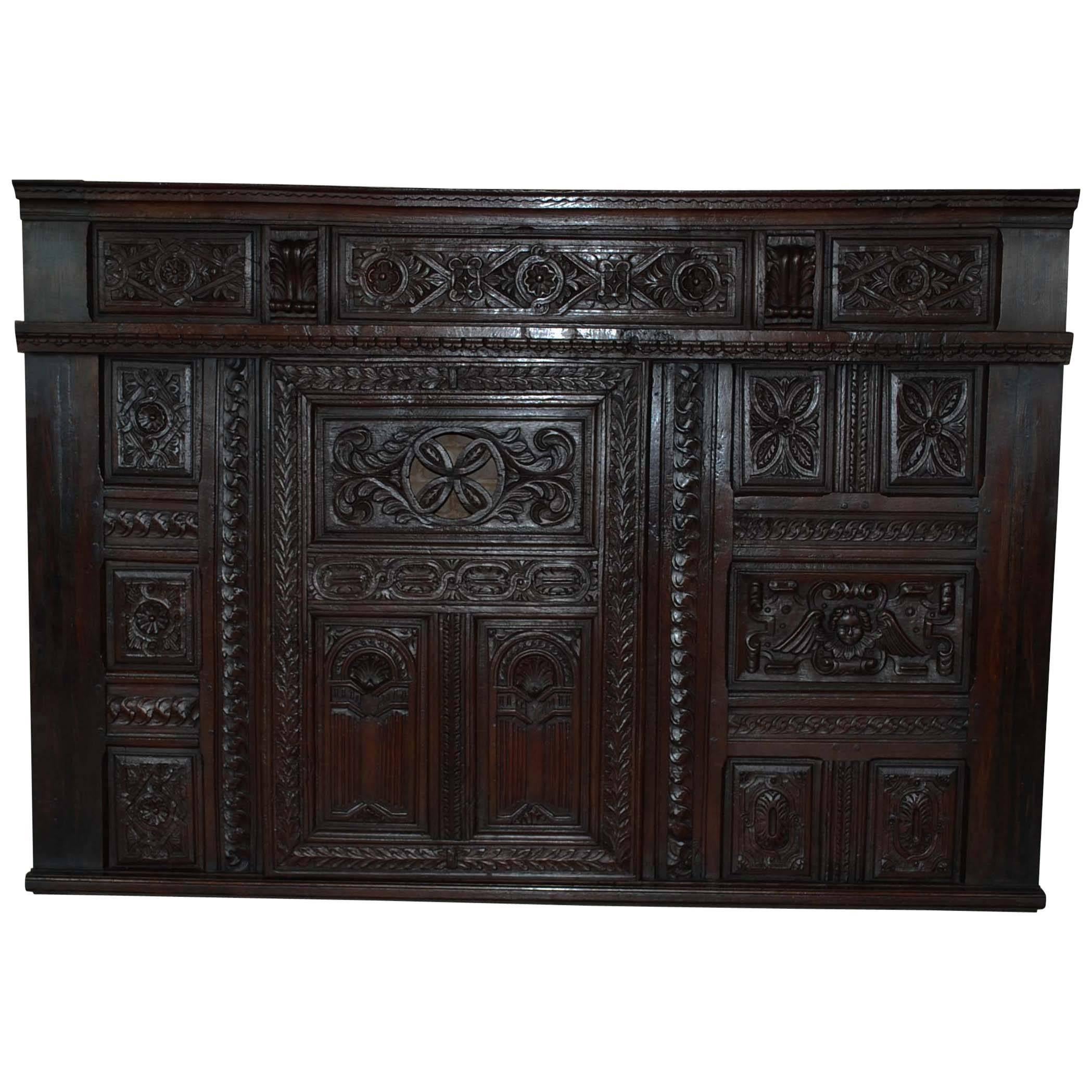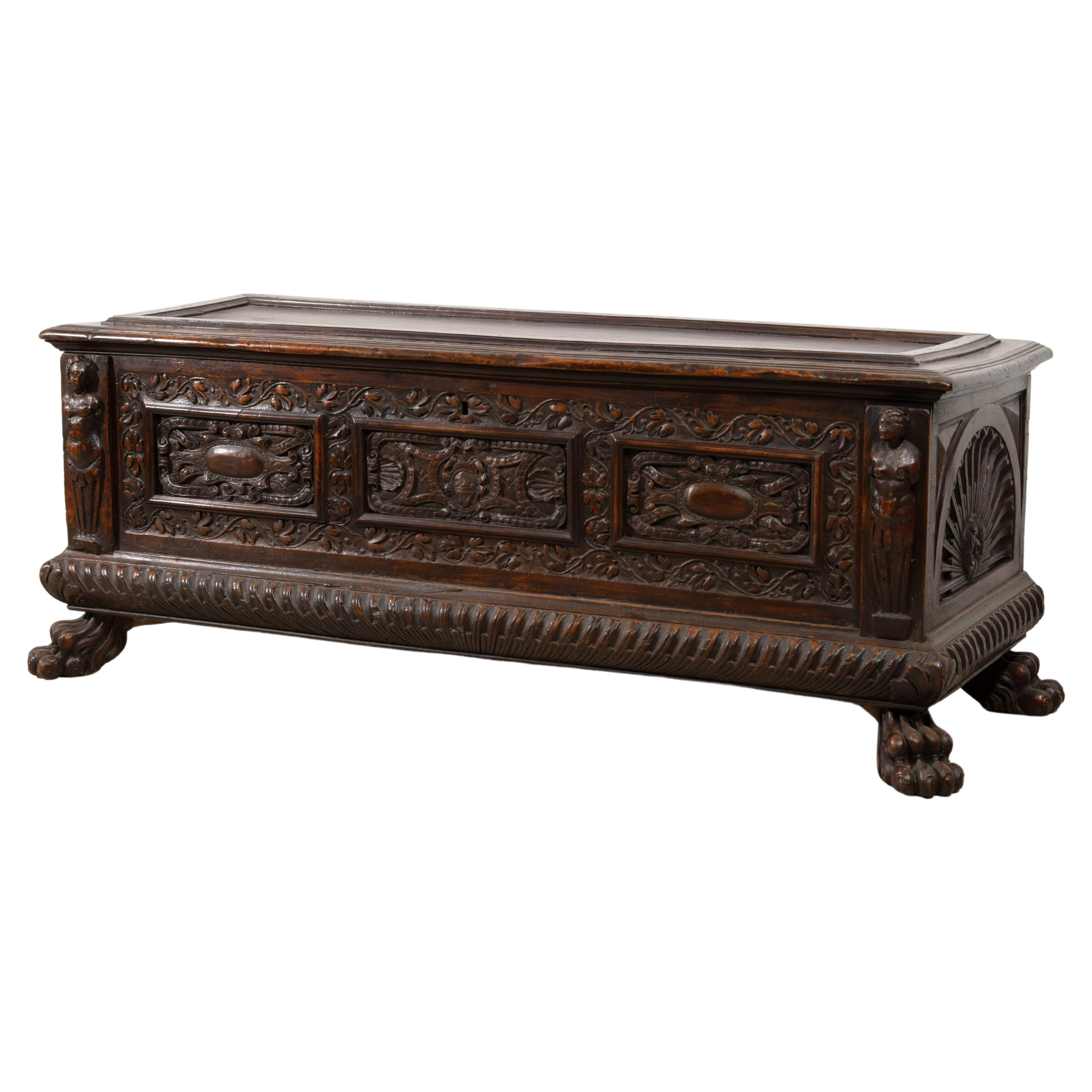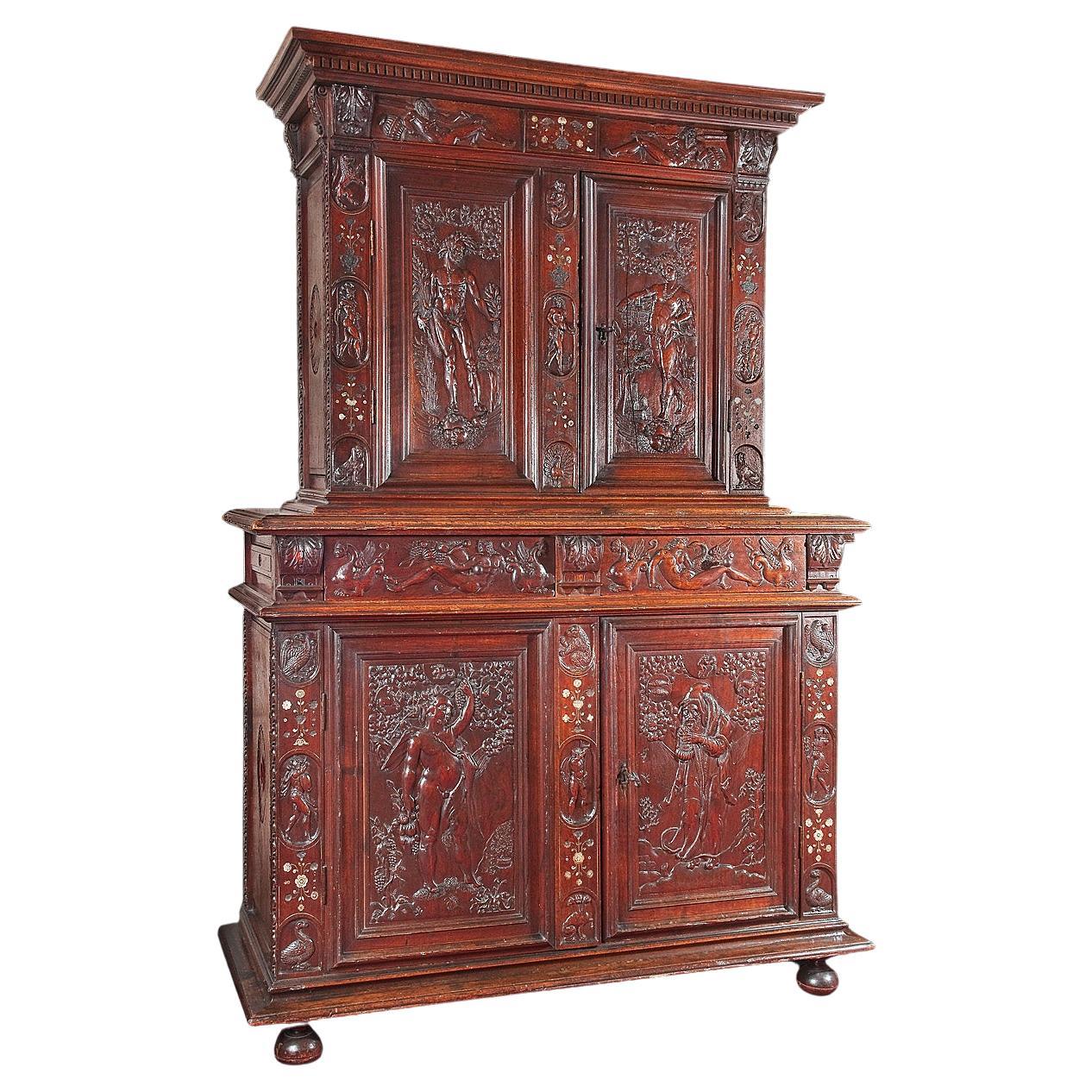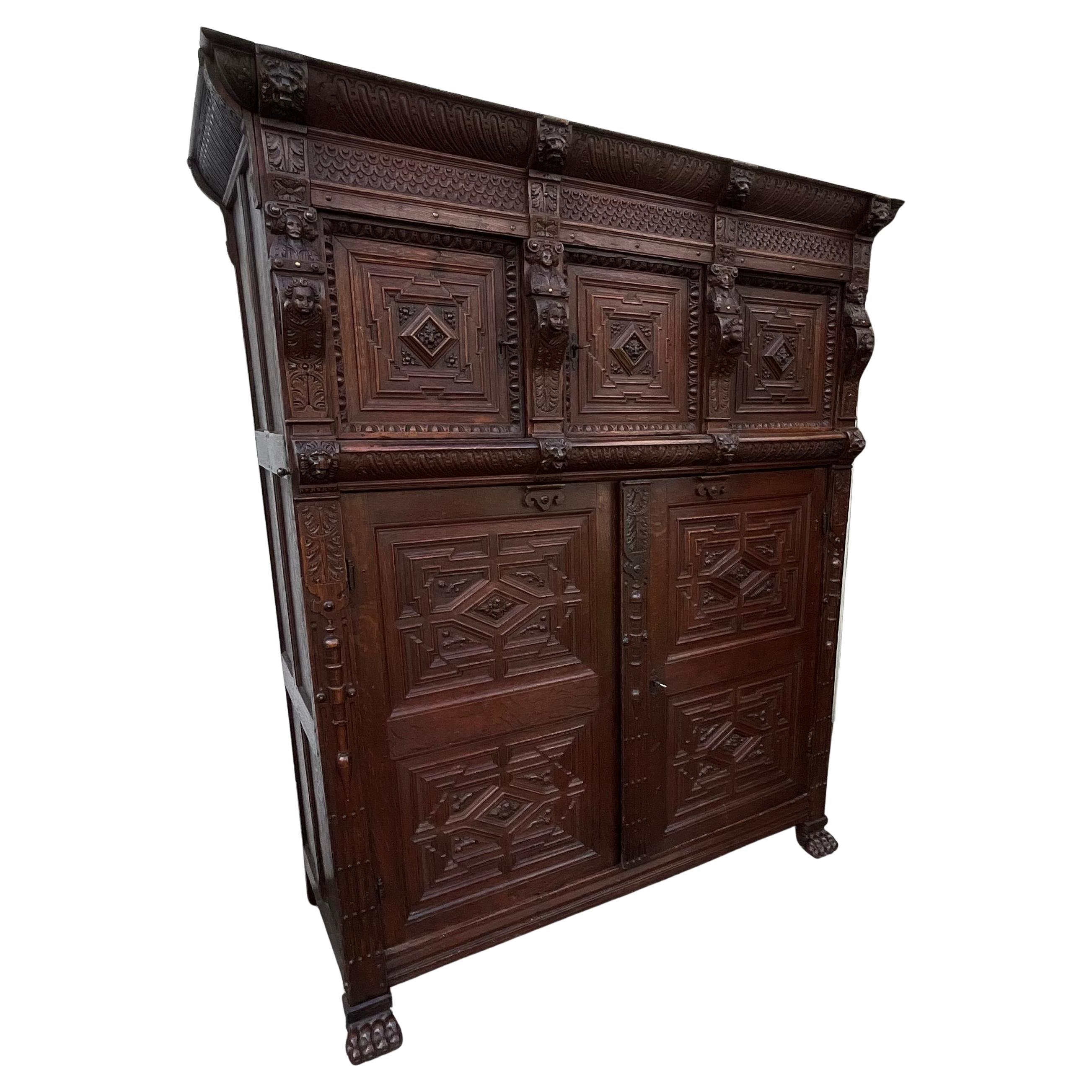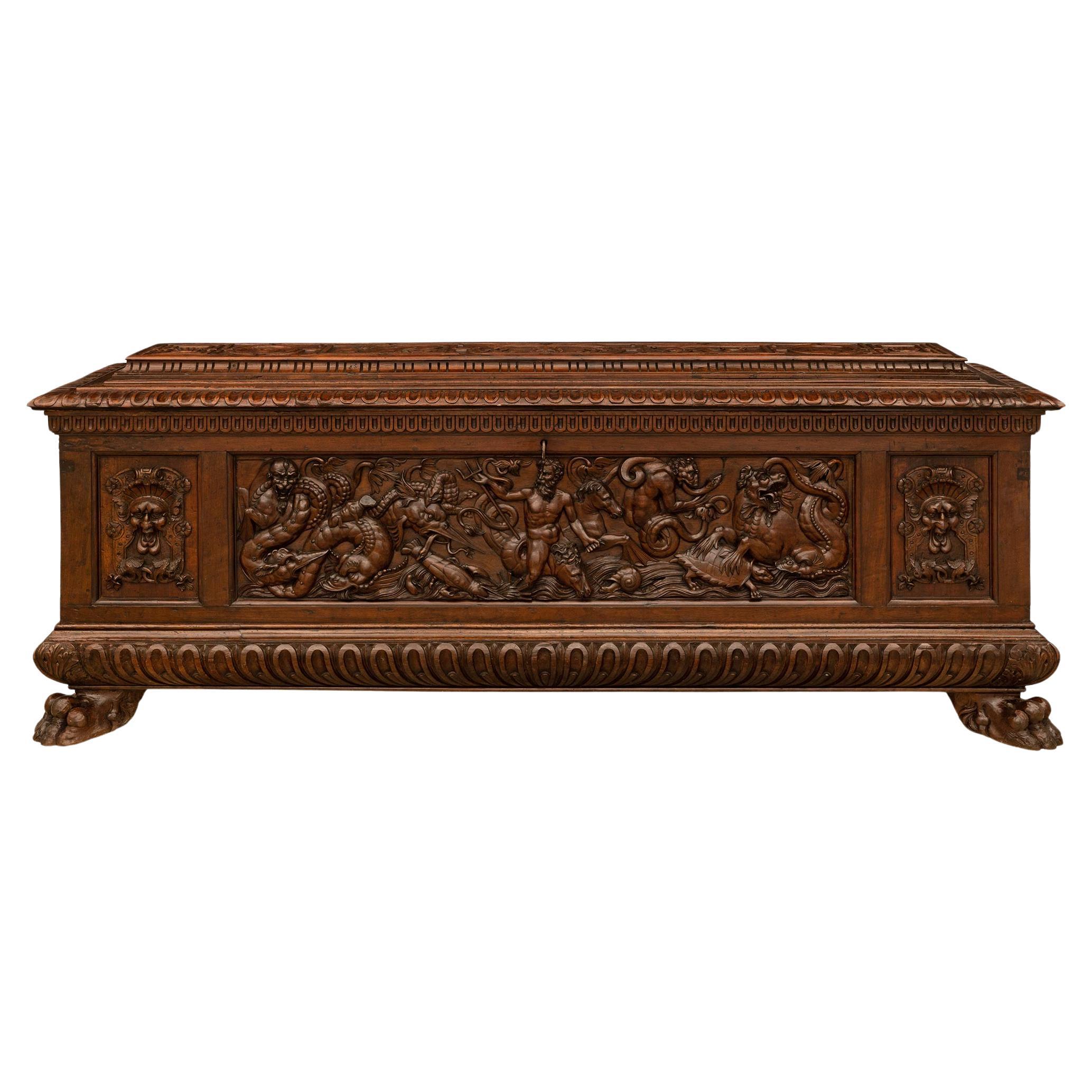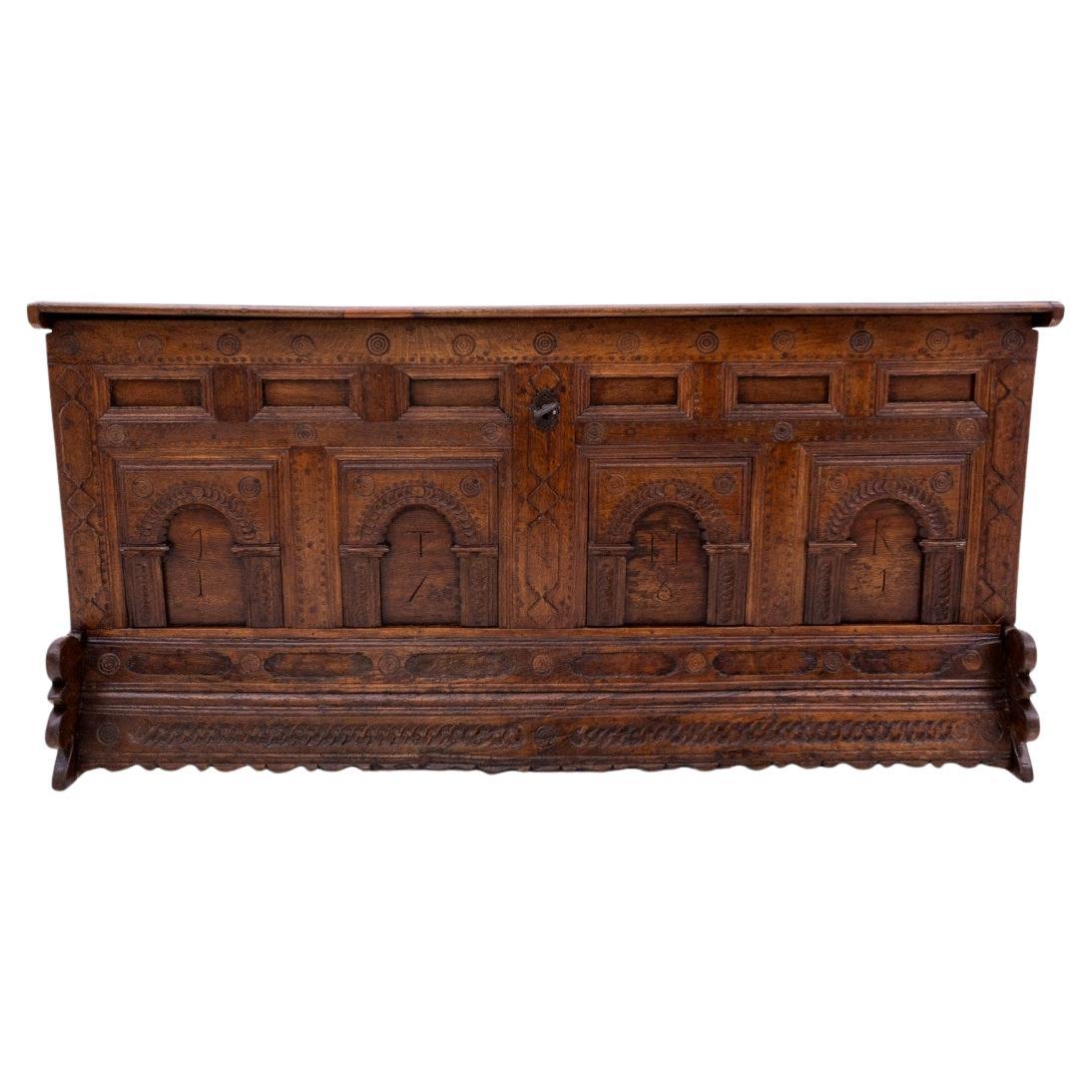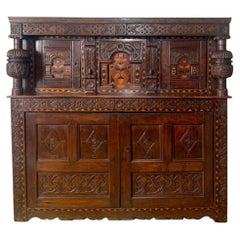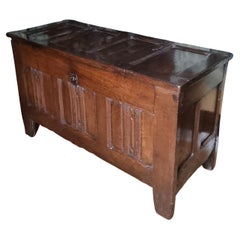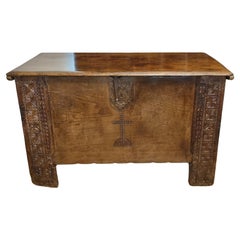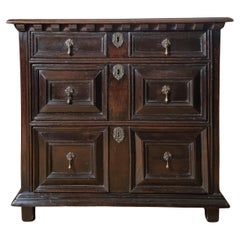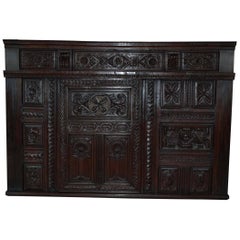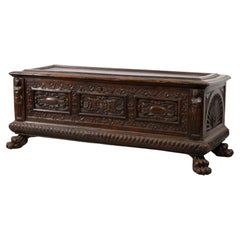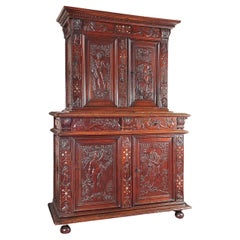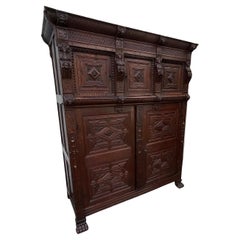Items Similar to 16th Century Venetian Renaissance Cedar Wood Cassone
Want more images or videos?
Request additional images or videos from the seller
1 of 11
16th Century Venetian Renaissance Cedar Wood Cassone
$11,108.57
£8,250
€9,728.53
CA$15,389.43
A$17,260.27
CHF 9,038.94
MX$209,729.09
NOK 114,779.34
SEK 108,818.90
DKK 72,618.41
About the Item
A large 16th century Venetian cedar. wood Cassone is an exquisite example of the craftsmanship characteristic of the Italian Renaissance period, featuring beautifully detailed scenes dating to circa 1550-1580.
Made from cedar wood, the chest has a deep, rich patina. Cedar wood was prized during the Renaissance for its durability and resistance to decay, making it an ideal choice for fine furniture intended to last for generations.
In Renaissance Venice, cassoni were a standard part of a bride's dowry among the nobility and wealthy merchant classes. Venice was a thriving trade hub with a population of about 150,000 in the mid-16th century, and the upper classes commissioned these chests .
The decoration of the chest is particularly breathtaking. Its surface features intricate figural panels that depict various scenes, which include historical, mythological, and symbolic representations. Among these are 16th century knights, chariots, mythical beasts, and lions. The designs are expertly silhouetted against a recessed ground, giving a three-dimensional quality that enhances their visual impact.
The use of punch-work, a decorative technique involving the stamping of the wood with a mesh-like pattern, adds texture and depth to the surfaces. This technique is indicative of the meticulous attention to detail for which artisans in Italy were known during this period.
Overall, this Venetian Cassone is not only a functional piece of furniture but also a work of art that encapsulates the times in which it was made.
This chest''s provenance ties it to Broom Hall, a Grade II listed mansion in Gwynedd, built for Rowland Jones in the 18th century , a wealthy London attorney with cosmopolitan tastes.
Dimensions 187cm width x 65cm high x 60cm depth
- Dimensions:Height: 25.6 in (65 cm)Width: 73.63 in (187 cm)Depth: 23.63 in (60 cm)
- Style:Renaissance (Of the Period)
- Materials and Techniques:
- Place of Origin:
- Period:
- Date of Manufacture:1550-1580
- Condition:Wear consistent with age and use.
- Seller Location:Hoddesdon, GB
- Reference Number:1stDibs: LU9494244743992
About the Seller
5.0
Gold Seller
Premium sellers maintaining a 4.3+ rating and 24-hour response times
Established in 1987
1stDibs seller since 2023
15 sales on 1stDibs
- ShippingRetrieving quote...Shipping from: Hoddesdon, United Kingdom
- Return Policy
Authenticity Guarantee
In the unlikely event there’s an issue with an item’s authenticity, contact us within 1 year for a full refund. DetailsMoney-Back Guarantee
If your item is not as described, is damaged in transit, or does not arrive, contact us within 7 days for a full refund. Details24-Hour Cancellation
You have a 24-hour grace period in which to reconsider your purchase, with no questions asked.Vetted Professional Sellers
Our world-class sellers must adhere to strict standards for service and quality, maintaining the integrity of our listings.Price-Match Guarantee
If you find that a seller listed the same item for a lower price elsewhere, we’ll match it.Trusted Global Delivery
Our best-in-class carrier network provides specialized shipping options worldwide, including custom delivery.More From This Seller
View AllLate Elizabethan Oak Court Cupboard Circa 1600
Located in Hoddesdon, GB
Elizabethan , Joined Oak , Court Cupboard Circa 1600 . Elizabethan carved cup and cover columns , original candle shelf , two upper doors and central panel beautifully inlaid with ho...
Category
Antique 16th Century British Elizabethan Cupboards
Materials
Oak
16th Century Henry VIII English Oak Linenfold Chest / Coffer
Located in Hoddesdon, GB
A 16th-century Henry VIII English Oak Linenfold Chest, circa 1540, is a rare example. Made from solid oak boards, the chest features a four-panel lid r...
Category
Antique 16th Century British Tudor Blanket Chests
Materials
Oak
Spanish Gothic Oak Cathedral Chest / Coffer Circa 1600
Located in Hoddesdon, GB
Spanish Gothic Cathedral Chest, Circa 1600, decorated with Gothic motifs and a central cross. Built from solid oak , showcasing a beautiful aged patina. It shows reassuring signs of ...
Category
Antique 16th Century Spanish Gothic Blanket Chests
Materials
Oak
17th Century Charles II Oak Chest of Drawers of Small Proportions
Located in Hoddesdon, GB
A fine 17th-century Charles II nicely proportioned oak chest of drawers. It features a rectangular planked top. The chest has 2 short and two long drawers, lined with oak, brass drop...
Category
Antique 17th Century British Charles II Commodes and Chests of Drawers
Materials
Oak
17th Century Oak Chest of Drawers , Charles II Period
Located in Hoddesdon, GB
A late 17th-century English Oak chest of drawers, circa 1680, from the Charles II period.
This exceptionally well-constructed sturdy chest showcases durability of oak, complemented...
Category
Antique 17th Century English Charles II Commodes and Chests of Drawers
Materials
Brass
17th Century Geometric Inlaid Walnut Chest of Drawers Circa 1660
Located in Hoddesdon, GB
An extremely rare 17th-century inlaid walnut geometric chest of drawers dating to 1660, featuring two short drawers, one large central cushion drawer, two lower long drawers, and one...
Category
Antique 17th Century British Charles II Commodes and Chests of Drawers
Materials
Walnut
You May Also Like
17th Century French Renaissance Hand-Carved Front Section of a Built in Cabinet
Located in Casteren, NL
This beautiful carved Renaissance front section was a part of a built in cabinet.
The carvings are typical for Bretagne area in France and it can be ...
Category
Antique Mid-17th Century French Renaissance Cabinets
Materials
Oak
$2,610 Sale Price
50% Off
XVI Century, Italian Renaissance Wood Chest
Located in IT
XVI Century, Italian Renaissance wood chest.
This important noble chest of the Tuscan Renaissance was built towards the end of the sixteenth centur...
Category
Antique 16th Century Italian Renaissance Blanket Chests
Materials
Nutwood
$19,217 Sale Price
25% Off
Rare Renaissance Cabinet Richly Carved
Located in Saint-Ouen, FR
This rare Renaissance cabinet is richly decorated on the doors and drawers with carvings depicting the four seasons, and on the uprights and the entablature, alternating flower bouquets inlaid with mother of pearl. This is a beautifully conceived piece of furniture, representing a crowned portico with its entablature and cornice.
The upper body
Articulated separately in a ternary rhythm, as with the lower body, the upper part opens with two carved doors. The doors are framed by both the lateral uprights and the casing. There are cartouches carved into the casing in which mythological figures are depicted with flower bouquets.
On the doors:
On the right: Spring, a female figure crowned with a wreath of leaves, holding a basket full of flowers. She is wearing necklaces and bracelets on each arm, with drapery discretely wrapped around her body and is standing on a winged putti’s head. On each side are depicted a tree and a village with a steepled church. Above her head floats the three signs of the zodiac corresponding to the season: Aries, Taurus and Gemini.
On the left: Summer, a bearded man crowned with ears of corn and bearing armfuls of corn. He is standing on a similar winged putti, flanked by a tree and an ear of corn. The following three signs of the zodiac appear: Cancer, Leo and Virgo.
On the uprights and the central casing a number of smaller figures seem to represent virtues and vices that newly wedded couples should aspire to and avoid.
On each side, at the bottom of the uprights, there is a dog representing fidelity. Above, a lion embodies power, wisdom, and justice.
In between, on the left upright, there is a figure of noncombatant Athena wearing a helmet and holding a spear, an arrow pointing down and in her left hand, a shield, symbol of protective power. On the right upright, the goddess Venus controls the arrow of Cupid.
The iconography here acts as a clear reminder of the required virtues that both parts of a young couple need to fulfill: fidelity, power, wisdom and justice. For him, the goddess Athena focuses on the power. Whereas for her, it is Venus who shows how to control Cupid’s arrow.
On the central casing at the bottom, by way of contrast, there is a peacock, a symbol of pride and at the top, a monkey representing lust and mischief. In between, a woman holding a chain and a cup full of precious stones while on the floor sits a half empty opened casket. This can be interpreted as a symbol of extravagance.
Above, the entablature, decorated with male figures resting on leaking urns, may symbolize the passing of time. They are flanked by two consoles decorated with acanthus leaves and separated by flower bouquets (inlaid with mother of pearl). Finally on top, a cornice acts as a crown for the piece of furniture.
The lower body
The moulded base stands on four round, flattened feet.
Represented on the doors:
On the left: Autumn, a stocky, naked man crowned with vine leaves, holding fruits in his right hand and with his left, picking a bunch of grapes from a climbing vine. Standing on a mound, he is surrounded by a vine and a hill, at the foot of which a man presses the grapes in a big vat after the harvest. Above the climbing vine appear the signs of Libra, Scorpio and Sagittarius.
On the right: Winter, an elderly man wearing a fur cloak...
Category
Antique 16th Century French Renaissance Cabinets
Materials
Walnut
Renaissance Style Furniture In Solid Oak, Early 19th Century
Located in SAINT-CLÉMENT-DE-LA-PLACE, FR
This imposing French sideboard, dating from the early 19th century, is crafted from solid oak in an expressive Renaissance Revival style. It originates from a manor house in Brittany...
Category
Antique 1820s French Baroque Revival Cabinets
Materials
Oak
Italian late 16th century Baroque period Walnut Cassone
Located in West Palm Beach, FL
A very handsome and high quality Italian late 16th century Baroque period Walnut Cassone. This exceptional Cassone is of museum quality with the phenomenal detailing and attention to...
Category
Antique 16th Century Italian Commodes and Chests of Drawers
Materials
Walnut
Baroque wooden chest from 1781.
Located in Chorzów, PL
Baroque chest from 1781.
Furniture in very good condition, after professional renovation.
dimensions: height 76 cm length 160 cm depth 80 cm
Category
Antique Late 18th Century Unknown Baroque Revival Commodes and Chests of...
Materials
Oak
More Ways To Browse
Renaissance Wood Carved
Wood 16th Century
16th Century Italian Furniture
16th Century Wood Furniture
Antique Beast
Renaissance Wood Panels
16th Century Antiques
16th Century Italian Wood
16th Century Venetian
16th Century Carved Panel
Antique Cedar Chest
Mesh Cabinet
16th Century Italian Cabinet
Carved Hall Chest
16th Century Wood Chest
Antique Merchant Chest
Venetian Carved Figure
Italian Cassone
